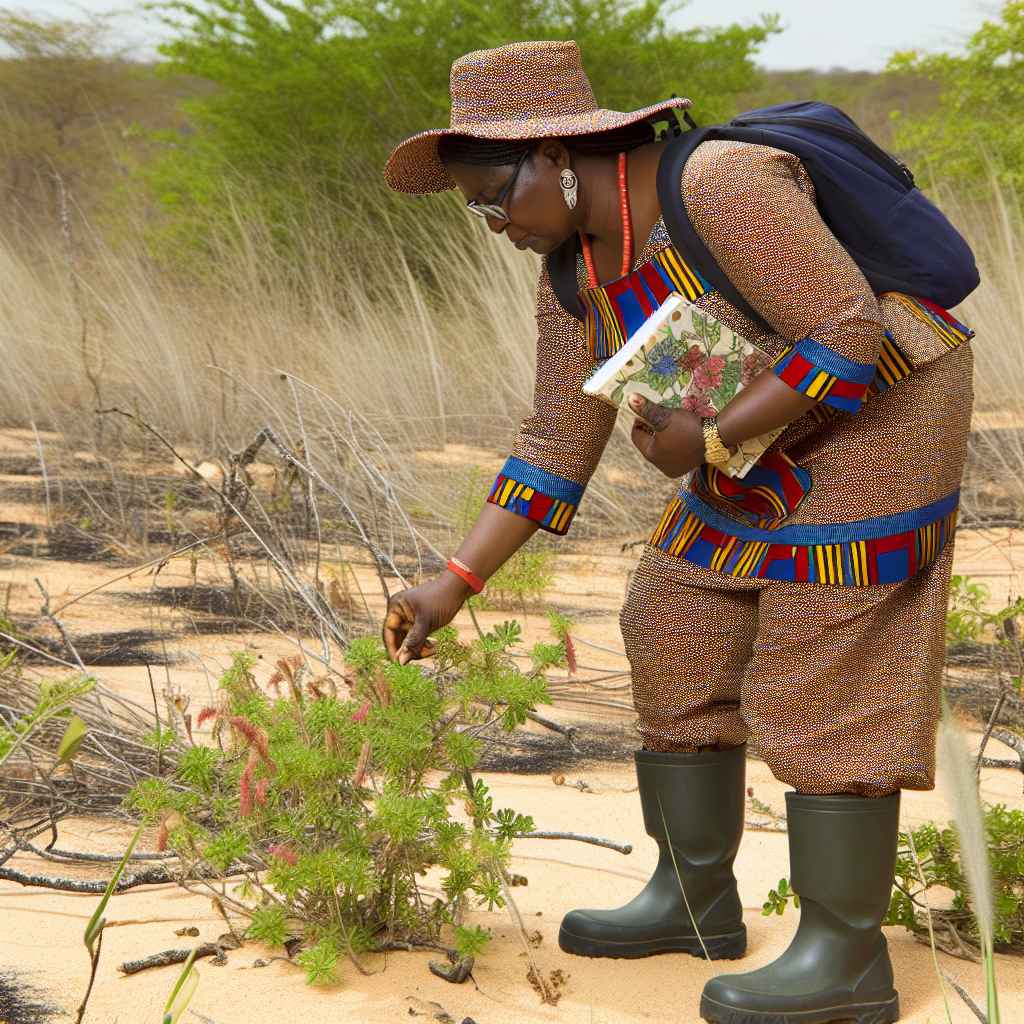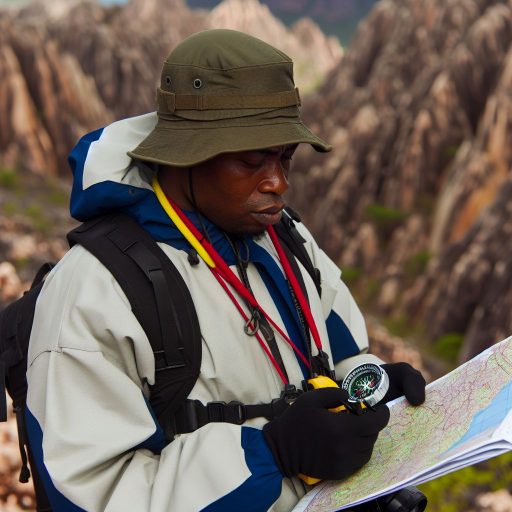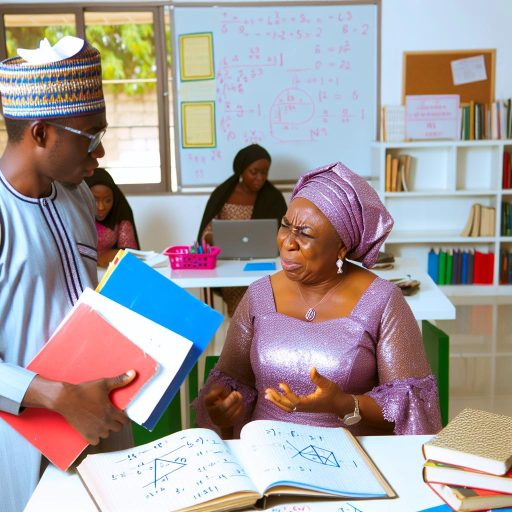Introduction
In Nigerian culture, traditional knowledge encompasses the wisdom, practices, and beliefs passed down through generations.
It serves as a foundation for understanding the environment and promoting sustainable coexistence.
Brief Explanation of Traditional Knowledge in Nigerian Culture
Traditional knowledge in Nigerian culture includes indigenous practices related to agriculture, medicine, wildlife conservation, and ecological management.
It is often deeply rooted in spiritual beliefs and community traditions.
Importance of Integrating Traditional Knowledge in Ecology
Integrating traditional knowledge in ecology is crucial for preserving biodiversity, maintaining ecosystem balance, and promoting sustainable development.
Indigenous practices are often based on centuries of observation and adaptation to local environments.
Overview of the Blog Post
In this blog post, we will explore the significance of incorporating traditional knowledge into ecological conservation efforts in Nigeria.
We will discuss successful examples of indigenous practices that have contributed to biodiversity conservation.
Furthermore, we will highlight the importance of respecting and integrating traditional wisdom in modern ecological research and management.
Traditional Ecological Knowledge (TEK) in Nigeria
Traditional Ecological Knowledge (TEK) refers to the knowledge, practices, and beliefs accumulated over generations by indigenous communities.
Definition of TEK
TEK encompasses a wide range of traditional knowledge systems related to natural resource management, biodiversity conservation, and sustainable development.
It includes indigenous practices, beliefs, and values that have been passed down orally from one generation to another.
Examples of traditional ecological practices in Nigeria
- Agroforestry techniques such as intercropping and tree planting to enhance soil fertility and crop yields.
- Water harvesting methods like building terraces and dams to conserve water and prevent soil erosion.
- Traditional medicine using plant extracts for healing various ailments and promoting overall well-being.
- Wildlife conservation practices like taboos and rituals to protect endangered species and their habitats.
Role of TEK in sustainable resource management
TEK plays a vital role in ensuring the sustainable use of natural resources and the conservation of biodiversity in Nigeria.
Indigenous communities have developed intricate knowledge systems that help them adapt to environmental changes and promote ecosystem resilience.
TEK promotes a harmonious relationship between humans and nature, fostering the sustainable management of forests, rivers, and other natural resources.
By integrating TEK into modern conservation strategies and policies, Nigeria can benefit from the wisdom and experiences of its indigenous populations.
Furthermore, TEK can help bridge the gap between traditional practices and scientific knowledge, leading to more effective and holistic resource management approaches.
TEK is a valuable asset that should be acknowledged, respected, and integrated into efforts to protect Nigeria’s diverse ecosystems and promote sustainable development.
Challenges of Integrating Traditional Knowledge
Lack of recognition and validation of traditional knowledge.
Conflict with modern scientific practices.
Threats to traditional practices due to urbanization and globalization.
One of the major challenges in integrating traditional knowledge in Nigerian ecology is the lack of recognition and validation of indigenous practices.
Traditional knowledge, passed down through generations, is often dismissed or disregarded in favor of Western scientific methods.
This creates a barrier to incorporating valuable insights and solutions that have been developed over centuries by indigenous communities.
Additionally, there is a conflict between traditional knowledge and modern scientific practices.
While traditional ecological knowledge emphasizes the interconnectedness of nature and human beings, modern science often approaches ecology through a reductionist lens.
This focuses on isolated variables and linear cause-effect relationships.
This clash in perspectives can hinder the effective integration of diverse knowledge systems.
Urbanization and globalization pose significant threats to traditional practices in Nigeria.
As cities expand and industries grow, traditional habitats and natural resources are increasingly under pressure.
This leads to the erosion of indigenous knowledge and practices, as communities are forced to adapt to changing landscapes and lifestyles.
The rapid pace of development and global influences can disrupt the transmission of traditional knowledge from elders to younger generations.
By recognizing the value of indigenous practices, we can bridge the gap between traditional and scientific perspectives.
Supporting the preservation of traditional knowledge in the face of urbanization and globalization is crucial.
We can work towards a more sustainable and holistic approach to ecological management.
Gain More Insights: Environmental Impact on Marine Life in Nigeria
Enhancing Biodiversity Conservation
Traditional knowledge often holds valuable insights into the local flora and fauna.
These insights include sustainable practices for preserving biodiversity.
Indigenous communities possess a deep understanding of ecological systems.
This knowledge includes the interconnectedness of species.
Transform Your Career with Expert Guidance
Get personalized mentorship consulting that’s tailored to your unique path. Our expert advice is actionable and exclusive.
Get StartedBy integrating traditional knowledge into modern conservation efforts, we enhance our ability to protect and restore various ecosystems.
Promoting Sustainable Agriculture and Land Use Practices
Traditional knowledge is rich in agricultural practices passed down through generations.
These practices align with nature’s rhythms and cycles.
Incorporating traditional farming methods promotes long-term sustainability.
We can improve soil health, water conservation, and crop resilience through these practices.
This approach leads to increased food security.
It also decreases dependency on environmentally harmful practices.
Preserving Cultural Heritage and Traditions
Integrating traditional knowledge in ecology benefits the environment and preserves cultural heritage.
Indigenous communities have a deep connection to the land and its resources.
This connection is reflected in their customs, rituals, and knowledge systems.
Recognizing and valuing this wisdom ensures that cultural diversity is preserved.
This preservation fosters pride and identity among indigenous communities.
It also strengthens social cohesion and well-being.
Explore Further: Mathematical Modeling in Nigerian Industries
Successful Case Studies of Traditional Knowledge Integration
Exploring community-based conservation initiatives in Nigeria can provide valuable insights into the successful integration of traditional knowledge in ecological practices.
By collaborating with indigenous communities, researchers have been able to leverage local wisdom and practices to enhance conservation efforts and promote sustainable development.
Community-based Conservation Initiatives in Nigeria
In Nigeria, there are numerous examples of community-based conservation initiatives that have successfully integrated traditional knowledge.
One such initiative is the Gashaka Gumti National Park, where local communities have participated in wildlife monitoring and habitat restoration efforts.
By involving community members in conservation activities, the park has been able to foster a sense of ownership and stewardship among local residents, leading to improved conservation outcomes.
Another example is the Omo Forest Reserve, where traditional practices such as sacred groves and taboos have been recognized and incorporated into conservation strategies.
These practices have helped protect the biodiversity of the reserve and maintain the ecological balance of the ecosystem.
Collaboration between Indigenous Communities and Researchers
The successful integration of traditional knowledge in Nigerian ecology has been facilitated by strong collaborations between indigenous communities and researchers.
By working together, researchers can gain valuable insights into local ecological knowledge and practices, while indigenous communities can benefit from scientific expertise and technical support.
For example, the Cross River State Forestry Commission has partnered with local indigenous groups to develop sustainable forest management plans.
Through this collaboration, traditional practices such as rotational farming and controlled hunting have been integrated into modern conservation strategies, leading to the protection of valuable forest resources and the preservation of biodiversity.
Positive Outcomes of Implementing Traditional Ecological Practices
Implementing traditional ecological practices in Nigeria has resulted in numerous positive outcomes, including improved biodiversity conservation, enhanced ecosystem resilience, and increased community engagement in conservation efforts.
By recognizing and incorporating traditional knowledge, conservationists have been able to achieve sustainable and effective conservation outcomes.
Furthermore, the integration of traditional ecological practices has helped strengthen the cultural identity and resilience of indigenous communities, fostering a sense of pride and stewardship among local residents.
This has led to increased cooperation and collaboration between communities and conservation organizations, resulting in more successful conservation initiatives and positive environmental outcomes.
You Might Also Like: Overview of Geophysical Methods in Nigeria

Developing policies that support the integration of TEK
Government involvement is crucial in creating policies that protect traditional ecological knowledge.
Educating policymakers on the importance of incorporating indigenous practices in ecology is essential.
Creating incentives for industries to implement traditional knowledge into their operations will promote usage.
Monitoring and enforcing compliance with policies that promote the preservation of TEK is vital.
Engaging with local communities and indigenous groups
Establishing dialogue with communities helps to understand and respect their traditional knowledge systems.
Collaborating with indigenous groups allows for co-creating sustainable environmental management plans.
Supporting community-led initiatives showcases the relevance and effectiveness of traditional practices.
Providing resources and funding empowers local communities to preserve and pass on their knowledge.
Encouraging research and documentation of traditional ecological practices
Funding research projects focusing on documenting and preserving traditional ecological knowledge is crucial.
Supporting institutions that specialize in studying and promoting indigenous practices is beneficial.
Training young researchers in methodologies for collecting and analyzing traditional knowledge is important.
Creating databases or repositories helps store and share information on traditional practices effectively.
Learn More: Key Materials Used in Nigerian Ship Building
Integrating Traditional Knowledge in Nigerian Ecology
Integrating traditional knowledge in Nigerian ecology is crucial for sustainable environmental conservation.
By combining ancient wisdom with modern science, we can achieve a holistic approach to conservation.
It is essential to recognize and respect the cultural heritage and expertise of indigenous communities.
Supporting and preserving traditional ecological practices can help maintain biodiversity and ecosystem balance.
We must actively engage with local communities to learn from their wisdom and experience.
Collaborating with indigenous peoples can lead to innovative solutions for environmental challenges.
Cultural diversity plays a vital role in enriching and enhancing our conservation efforts.
Let us all commit to honoring and valuing traditional knowledge in our ecological endeavors.
Together, we can create a more sustainable future for both nature and humanity.
Additional Resources
Leveraging Indigenous Knowledge for Effective Environmental …




